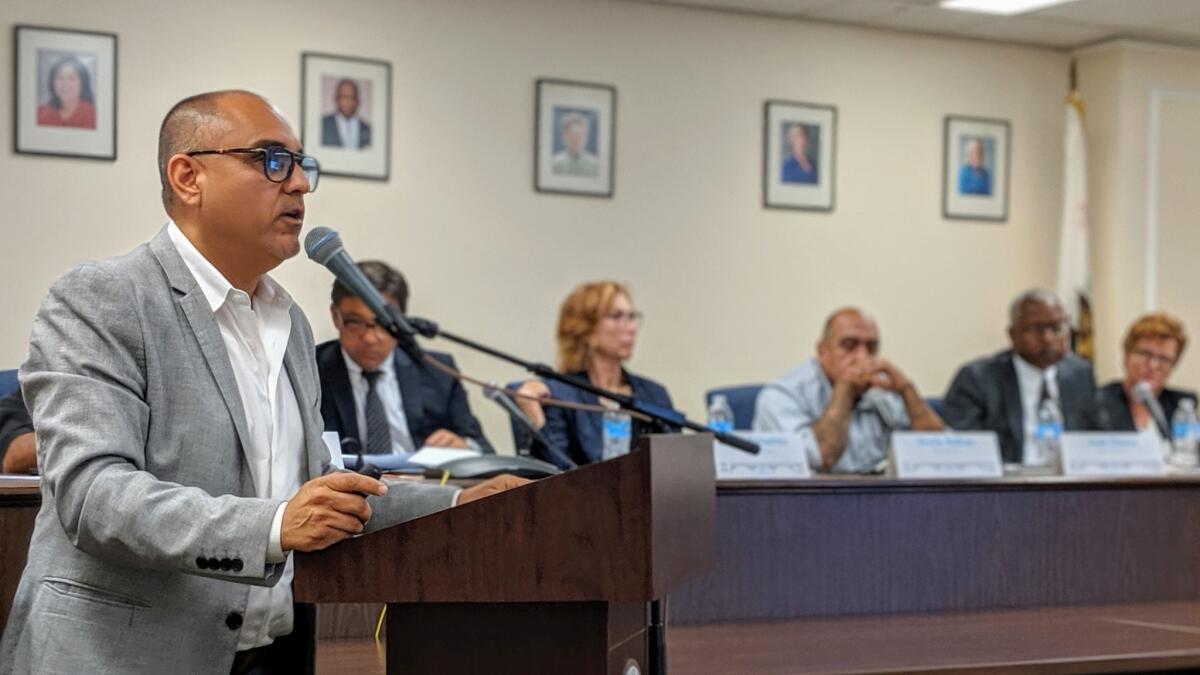L.A. County proposes new oversight panel for troubled Probation Department

Los Angeles County should create a large, robust new commission to oversee its troubled Probation Department, a reform group created by the Board of Supervisors said Thursday.
The plan by the Probation Reform and Implementation Team calls for a new oversight commission with authority to advise the board about the department as well as independently assess its policy priorities and investigate issues of concern.
“There is widespread consensus that the Los Angeles County Probation Department is in dire need of oversight,” according to the report, written after months of study by the reform team.
Probation officials, who attended Thursday’s announcement and have been involved in the process, said they appreciated the team’s work.
“We look forward to the board’s decision around the roles and responsibilities of the oversight commission and look forward to working with them as we continue to advance probation reform,” said department spokesman Dan Dawson.
At the request of the board, that team has for months conducted more than a dozen hearings from Lancaster to Long Beach. It reviewed documents and data to form a comprehensive reform plan for problems plaguing the department, which has had five chiefs in the last decade and faces significant challenges with its facilities, budget and labor relations.
“This is a sea of change for Los Angeles County that drew on community wisdom and subject matter expertise to develop solutions for an agency that impacts the freedom, well-being and life outcomes of so many Angelenos,” said Saúl Sarabia, who has presided over the reform team’s meetings.
The plan as proposed would potentially give the new committee significant staff — as many as 20 additional employees — and authority to compel cooperation from the department, differentiating it from the current volunteer Probation Commission it would replace.
The team made numerous suggestions about the new commission’s governance and mission. They centered on giving the commission authority to compel responses to information requests, write its own reports and conduct independent investigations.
The formal announcement came during a packed hearing at the county Hall of Administration downtown, where justice reform advocates and others listened and offered comment on the 26-page report.
“This is an enormous opportunity for residents of L.A. County to really foster huge, transformational change,” said Anthony Robles, an organizer with Youth Justice Coalition.
It’s unclear how much the new commission might cost. The supervisors still must decide numerous thorny governance issues before the panel does any work, starting with its composition.
The team suggested a nine-member group, with five members appointed by the supervisors and others appointed by them. Whether the commission might have members with department experience or previous involvement with the justice system remains a question the supervisors must decide.
“It’s so important to have somebody who’s been in the department, working on the line with us, who knows what we’ve been through,” Thomas Bell, a deputy probation officer who works in the department’s camps, told the team on Thursday.
Whether the proposed commission will have subpoena power — and potentially the size of its staff — will also probably be a major sticking point for the board, which could make those decisions in the coming weeks, said Supervisor Mark Ridley-Thomas, who previewed the planned announcement about the commission on Wednesday.
The subpoena power issue has been a difficult question for the supervisors in the context of whether to afford it to a similar oversight group, created in 2016, at the Los Angeles County Sheriff’s Department.
The county’s lawyers have been cool to the idea, noting that subpoena power could lead to clashes over law enforcement and investigative secrets. The voters however could compel the power next year when a ballot measure on the issue comes before them.
Though the department oversees tens of thousands of adult probationers, with 6,000 employees and a $1-billion budget, the thrust of the current reform effort is focused on juvenile detention facilities.
Its juvenile halls and camps house roughly 800 youths either awaiting disposition in courts or carrying out court-assigned rehabilitation.
The juvenile operation — the nation’s largest — has been under scrutiny amid reports of excessive pepper spray use by detention officers, as well as reports of increasing youth violence and plummeting staff morale.
“There’s overall concern about dysfunction in the department,” Ridley-Thomas said. “The heat now has shifted back to juveniles.”
The team led by Sarabia is expected to release its third and final report — a reform plan synthesizing previous recommendations to improve the department’s operations — by the end of the month.
He said the team hopes to present its full findings to the board at one of its regular weekly meeting soon so the supervisors can decide how to proceed.
More to Read
Sign up for Essential California
The most important California stories and recommendations in your inbox every morning.
You may occasionally receive promotional content from the Los Angeles Times.










